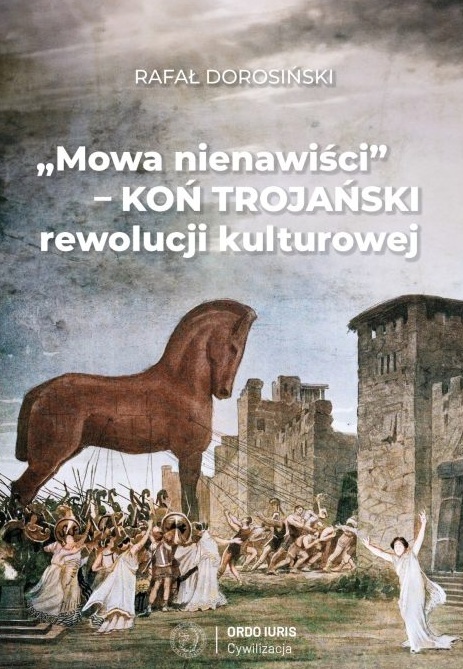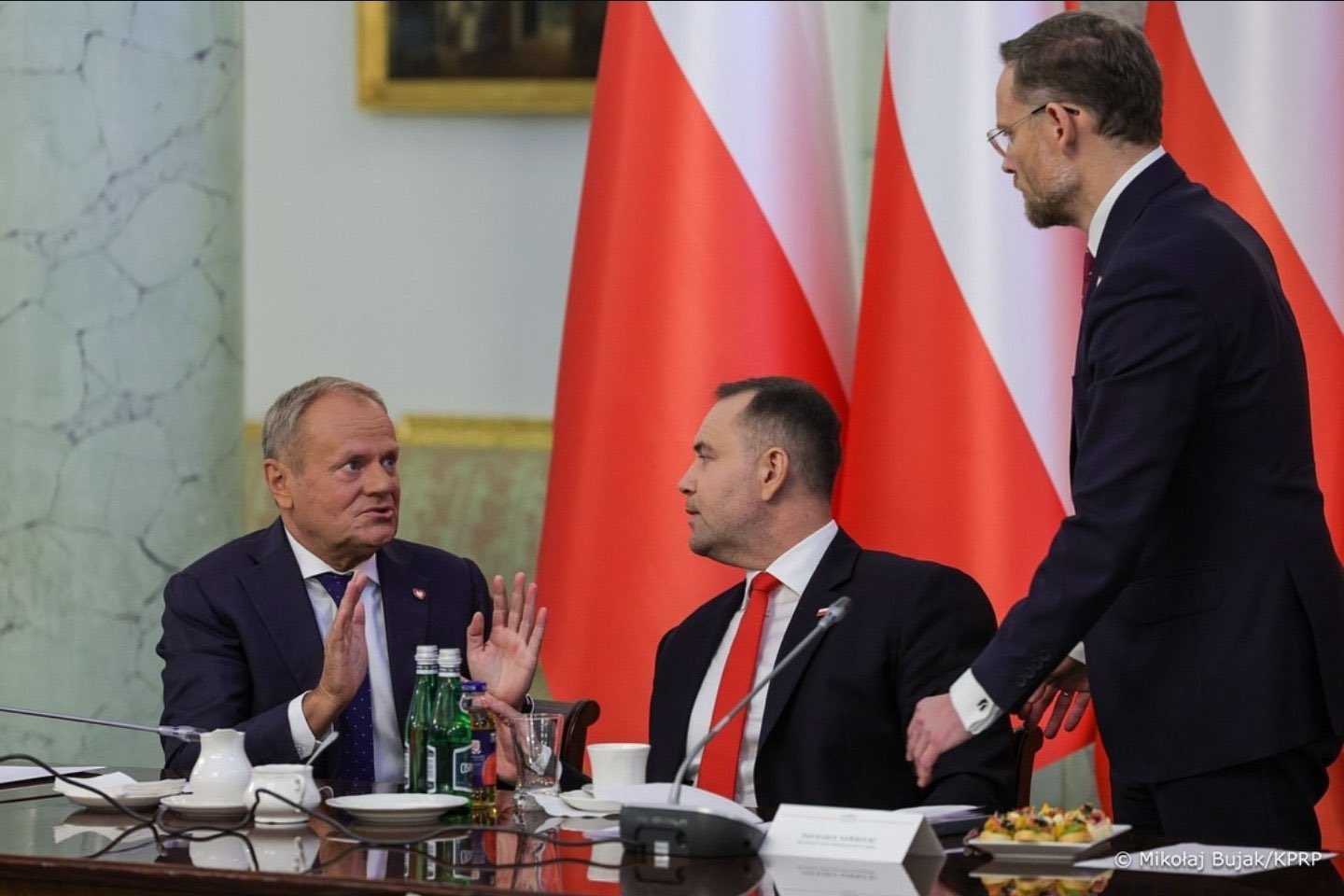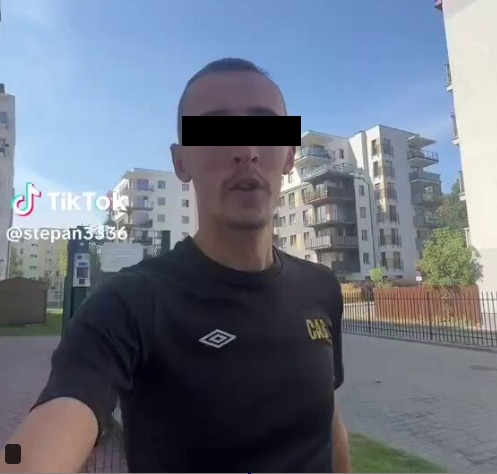The way in which the public debate uses the category of “talk of hatred” and its clear moral coloration let to see in it the tool of changing the moral assessments of selected social phenomena. This is done by recognising their opposition (or even their deficiency of open acceptance) as the expression “hate”. As a result, a fresh moral code is introduced, re-determining what is “good” and what is “bad” (immoral) and as specified deprived of a place in public debate. In this context, institutions of schools and universities deserve peculiar attention – we read in book Rafał Dorosiński "The Speech of hatred – a Horse of the Trojan Cultural Revolution".
Below, courtesy of the Ordo Iuris Institute, we present a fragment of the publication
***
Sep. VIII Consequences of the penalisation of “hate speech” and the proliferation of mechanisms to “anti-active” it
The main postulate of professional “tropicers” of “hate speech” (the organisations that have the top experience in combating hatred speech), activists and politicians of the left, LGBT activists and their dormitories is the introduction of criminal sanctions and the pursuit of “hate speech” on grounds of sexual orientation, “sexual identity”, gender, age and disability. This post is accompanied by a number of another requests, which the most complete list appears to have been drawn up by current Justice Minister Adam Bodnar in 2019 erstwhile he served as Ombudsman. This list, contained in the paper How to fight hatred speech. 20 RPO recommendations for Prime Minister, including:
• the establishment of ‘independent’ contact points and advisory bodies, supervising enforcement the obligations of net service providers to prevent "hate speech",
• awareness administrators of commercial online news portals about the work to moderate, filter and delete comments that may be ‘a hatred speech’,
• Introduction obligation net service providers notification law enforcement in cases of “hate speech”,
• conducting social campaigns aimed at school youth,
• driving training, workshops and training in schools, methodological training for teachers, police training, prosecutors and judges, training for lawyers and legal advisers,
• the engagement of the prosecutors, the National Broadcasting Council, the Commission for the Ethics of the Polish Parliament, and yet the authorities of cities and local authorities.
In a word, it is proposed that, among another things, almost the full state apparatus, the recently created specialised bodies, the media, local government, professional activists and teachers should be permanently screening the public debate in search of statements that could qualify under completely arbitrary criteria as “a hatred speech”.
Based on the experience of the countries in which this programme was implemented, and the achievements of publications, statements and projects of Polish activists, the risks associated with the implementation of the above-mentioned requests can be catalogued. Among them, alongside the suppression of public debate, is limiting freedom of thought and conscience and trying to introduce a fresh moral code.
Before illustrating the phenomenon with examples, note the notable assessment made by the Heritage Foundation. With the pen of 1 of his analysts, he comments on the postulates of leading theorists of "the fight against hatred speech", according to which the regulations themselves will not guarantee equality and justice. From here:
The release of society from the emotions that permeate “the speech of hatred” requires the transformation of the culture of the dominant group and its self-image, so that the affirmative image of number groups prevails in the awareness of oppressive groups and in society in general. Apparently, images and narratives produced by the culture of the dominant group should be replaced by a fresh mythology on excluded groups – while putting them beyond any criticism. It would so be unacceptable to question the narratives of allegedly oppressed groups, specified as: the full communicative is simply a patriarchal oppression aimed at subjugating women, sex is simply a social construct that can be freely chosen or the United States was built mainly on white supremacities.
The society attached to fundamental rights and political freedom must undergo a extremist change in order to implement the fresh moral doctrine hidden under the postulate of criminalization of “the speech of hatred”. If the "objective of the law" is to lead to "avoidance of hate", as any say, alternatively than the protection of life, freedom and property, it must be aimed at thoughts and beliefs. Freedom of expression of the parent group must be limited, utilizing the law, due to the fact that “focusing on speech and language can be 1 of the fewer ways to remedy unworded [racist] feelings, practices and patterns of behaviour.” In another words, the law must penetrate the corners of the head to justice and punish its motives.
In another words, the usage of the category of “hate speech” in public debate and its clear moral coloration let to see in it a tool for changing moral assessments of selected social phenomena. This is done by recognising their opposition (or even their deficiency of open acceptance) as the expression “hate”. As a result, a fresh moral code re-determining what is ‘good’ and what is ‘bad’ (immoral) and as specified deprived of a place in public debate. In this context, institutions of schools and universities deserve peculiar attention.
School hatred speech classes
Among the above-mentioned recommendations of the erstwhile RPO, a separate group (one of four) was called "social and legal awareness", which recommended the dissemination of "training, workshops and training in schools on the harmfulness of hatred speech". According to the publication on the basis of which these classes are conducted, the “speak of hatred” is to be “a sign of a deeper problem” and the proposed exercises “will aid to identify the real causes of it”. They rapidly turn out to be "stereotypes" with which facts and norms concerning sexuality, sexuality, matrimony and family, nation and religion are aligned.
Using as synonyms ‘speaks of hate’, specified words as ‘negative behaviour’, ‘inadequate content’, ‘disgusting information’ or ‘bad things’, these publications in particular:
a) protest classical views on sexuality and family
For example, a manual A compass. Education for human rights at work with children rejects the treatment of natural, biological household as normal. 1 exercise encourages children to "talk about different concepts and models of the family" and "invite children to reflect on different ways of surviving in the household and the definition of the family", as an example to discuss, among another things, "pairs of the same sex". Although the words “husband” and “wife” were missing from the publication of the place, it was for “family with same-sex parents”. In addition, the authors complain that many people "knowingly or unconsciously apply heterosexual standards to homosexual environments, blaming their representatives for not complying with the standards expected from "normal" people." In a different place (Flocks. Counteracting hatred speech online through human rights education) it is suggested that identifying with LGBT subculture is as natural as liking to play football, exercising the profession of hairdresser, or having a certain nationality. In turn, as part of the “education for human rights” the “education” is presented gender“the goal is to change the roles that girls and boys and women and men play in private and public life.” The means to do this is to convince children that "there are more sex options in the planet than just men and women" and that "the key to sex definition is sex identity, that is, internal, subjective self-esteem".
(b) advance pro-immigration attitudes
A permanent component of “school training, workshops and training on the harmfulness of hatred speech” is the unilateral presentation of immigration issues. There is any kind of moral blackmail in describing a complex social issue only by the prism of compassion and emotion, identifying opponents of mass immigration with suffering “phobia” racists. Class leaders are to address requests to "participants to imagine that they are young people in Iraq or Afghanistan, where the war has ruined the country", and questions about "what they would feel/feeling as an immigrant/immigrant".
The complexity of the consequences resulting from the collision of 2 different civilizations and the real, associated dangers are brought to “negative stereotypes”. Therefore, alternatively of a serious debate, participants are urged to consider "if young people can do anything to advance a more affirmative image of immigrants", and to "create a website or profile on social media where they would present affirmative stories about immigrants".
(c) teach censory behaviour, teach discussion
Instead of teaching respect for different views, the art of cultural conduct of dispute and the common pursuit of truth, they blur the difference between calling for force and vulgarity (refuse) and legitimate opinions and make a tendency to rapidly offend themselves, encouraging discussion and censorship of different views.
Participants learn to take “actions to study inappropriate content to website administrators”. They are instructed: “Use complaint reporting mechanisms or procedures to inform website owners of examples of hatred speech”, "Report instances of hatred speech to problem organisations", "Call on others to condemn or study hatred speech, express solidarity with victims or engage in another actions". It is indicated that ‘they may encourage another online activists to study breaches to website administrators’. They are told that “[of] declaring inappropriate content on the website is only the first step. Another is to study specified content to the authorities dealing with discrimination or straight to the police." Finally, it encourages us to look for answers to the question: "What else can you do to guarantee that complaints are made more effectively?"
When considering:
• the higher trend of training materials,
• their free approach to freedom of expression expressed, inter alia, in the communication to the participants, that “sometimes the right to freedom of expression can be restricted if it can harm another or threatening society” [R.D.],
• the rule adopted by intercessors to “fight the speech of hatred” that what is and what is not “the speech of hatred” determines the feelings of the addressee of the statement,
then it is reasonable to presume that, for participants of the class, “negative behaviour”, “inadequate content”, “insulting information” or “bad thing” may prove to be “normal and rational” statements contrary to the programme line described above. The only limit to what can be considered a “talk of hatred” is human imagination.
“The Speech of Hate” – a horse of the Trojan Cultural Revolution



















